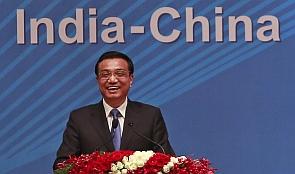 Chinese Premier Li Keqiang's visit to India showed the impact of patient and persuasive diplomacy on both sides - but it's the outcome that will matter, says Nitin Pai
Chinese Premier Li Keqiang's visit to India showed the impact of patient and persuasive diplomacy on both sides - but it's the outcome that will matter, says Nitin Pai
That sound you hear emanating from the direction of New Delhi is a huge, collective sigh of relief.
First, from ordinary Delhiites, already irritated by the heat of the summer, who had to put up with traffic management and securitycordons for the Chinese premier's visit.
Second, from the entire foreign service establishment, on whose shoulders lay the unenviable task of ensuring that the visit took place in the manner it did, after a month-long crisis over boundary incursions in eastern Ladakh.
Third, from the Chinese delegation itself, which would not have wanted the new premier's maiden outing to be spoiled by diplomatic failures or untoward incidents.
The principal challenge for officials on both sides was to ensure that the India-China relationship builds on shared interests while managing the nagging, complex and proximate bilateral problems. Political leaders on both sides are sensitive to the fact that stable, amicable bilateral relations are crucial to their ability to navigate their manifold domestic and international challenges. They also know that they cannot overrule domestic stakeholders in their disputes with the other side. It requires sagacity, statesmanship and astute diplomacy to walk this tightrope. Some of this was visible in New Delhi this week.
Premier Li Keqiang got the "strategic consensus and deepened strategic trust" he wanted. As S Jaishankar, our ambassador to China, explained, this "both indicates... the long-term nature of the understandings between us and the enormity of the implications of what it is that we were discussing". Bilateral mechanisms exist, but it is people that make them work. Given that Li is likely to remain in his position for the next decade, it is important for him and his team to establish a working relationship with the Indian side.
For his part, Prime Minister Manmohan Singh, we are informed, took a hard position on the boundary incursions. The use of the words "candid" and "frank" to describe the official meetings supports this contention. So, too, the activation of the special representatives to meet promptly and sort out the matter. Essentially, the Indian government's audience here was the Indian public, which had been treated to a higher dose of the usual narrative of pusillanimity in recent months. How much this show satisfies the nation and its representatives in the media remains to be seen.
A parsing of the joint statement reveals the gains of patient and persuasive diplomacy. Beijing has accepted the need for China to provide greater market access for Indian businesses. River water-sharing
is now on the table. Interestingly, the joint statement also included bilateral civilian nuclear cooperation and Chinese investment in Indian infrastructure.
All this looks bold and the details will be tricky. To the extent that the trade deficit with China is owing to the lower competitiveness of our exporters, Beijing's actions alone, when they are taken, will not suffice. Notwithstanding high-level agreements, if China's information-sharing and cooperation in river water management in the Mekong region is anything to go by, New Delhi should be prepared for frustratingly long waiting times before Chinese officials share hydrological data. As for civilian nuclear technology and infrastructure investments, the proverbial devil will be in the detail. To the extent that diplomacy is attempting to enlarge the sphere of shared interests, however, these are positive developments.
There have been further understandings on military cooperation, especially in the maritime domain, but the phrasing of the joint statement reflects the two countries' extant policy. India will continue to increase its presence in East Asia while China will do so in India's immediate neighbourhood. New Delhi and Beijing say relations with third countries will not be directed at each other. Anyone who believes such promises are more than niceties is bound to come to grief.
Li is perhaps the first Chinese leader to explicitly state what has been clear for several years: that Beijing is worried about a closer strategic tango between India and the United States. Quoting the analects of Confucius, Li noted that "a distant relative may not be useful as a near neighbour". What the Chinese premier didn't mention is that China has several neighbours and tends to be more useful to some than to the others. There is no indication yet that the pattern of neighbourly usefulness is about to change.
Li's decision to make a trip to India his first foreign engagement has been heralded as symbolic. It must also be noted that President Xi Jinping, Li's superior, visited Russia first and will meet President Obama next month. Conventional division of foreign policy responsibilities perhaps, but also indicative of how Beijing sees the international pecking order.
China's new leaders must be aware that at a time when their immediate predecessors have -- unwittingly or otherwise -- created a series of crises with each one of their East Asian neighbours, a handshake across the Himalayas is a pragmatic thing to engage in. Beijing cannot afford its southern flank to heat up. It does not want the spillover effects of the militancy in Afghanistan and Pakistan to further unsettle Xinjiang. It does not want to become Pakistan's sole provider. All this requires New Delhi's cooperation.
The writer is director of the Takshashila Institution, an independent public policy think tank
 Chinese Premier Li Keqiang's visit to India showed the impact of patient and persuasive diplomacy on both sides - but it's the outcome that will matter, says Nitin Pai
Chinese Premier Li Keqiang's visit to India showed the impact of patient and persuasive diplomacy on both sides - but it's the outcome that will matter, says Nitin Pai